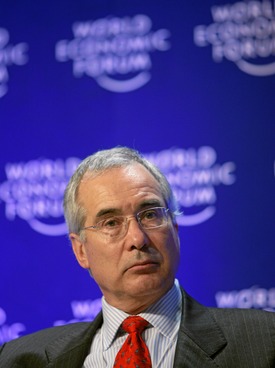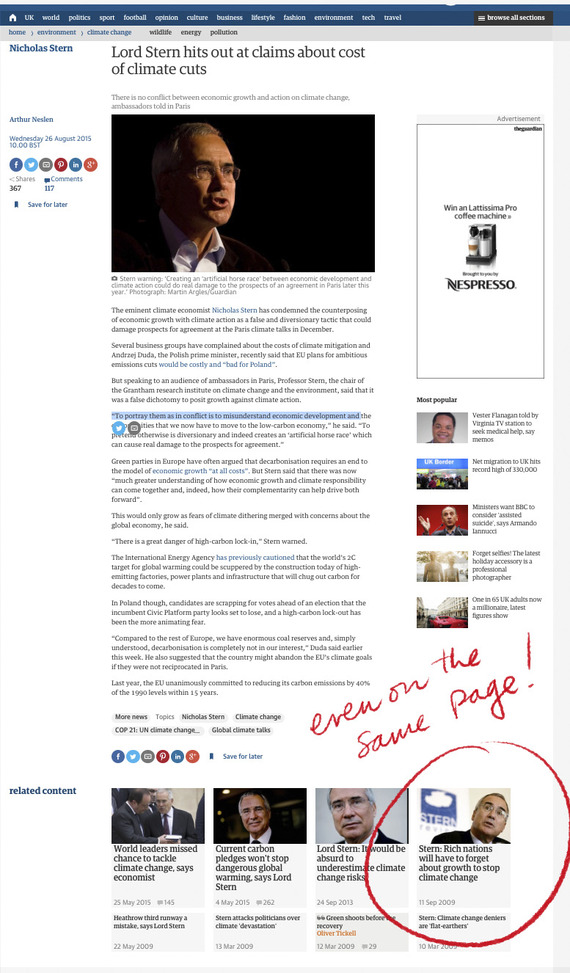 Bishop Hill
Bishop Hill The ever-changing story of Stern
 Aug 27, 2015
Aug 27, 2015  Economics
Economics  Lord Stern ponders what positions he might adopt after lunchLord Stern has mounted his high horse, ready to slay the dragon of opposition to anything he deems a good idea at the time.
Lord Stern ponders what positions he might adopt after lunchLord Stern has mounted his high horse, ready to slay the dragon of opposition to anything he deems a good idea at the time.
The problem is that Lord Stern's views seem fluid to say the least. Back in 2009 he was telling the world that rich nations would have to forgo growth in order to stop climate change.
Now he is telling us that portraying economic growth and climate change action as being in conflict is "diversionary" and a "misunderstanding of economic development".
The question readers want answered is "Does Lord Stern ever actually mean anything he says?".
(H/T Richard Tol)
 Bishop Hill
Bishop Hill




Reader Comments (59)
Brandan: Is this seriously the level of discourse here?
Discourse is a two-way street. If you want to raise the level, perhaps consider using fewer incredulous exclamation points and tone down the histrionics. I don't think you did offer 'a substantive response' -- in fact, you said you weren't interested in the context I was providing to Stern's comments. You certainly didn't show that anyone was wrong.
What you have done is provided obtuse quotes, and say (I paraphrase) "look, these aren't an explicit contradiction". If that's the 'level of discourse': everyone getting two turnips per week rather than one *is* economic growth.
Of course Stern isn't daft enough to make an explicit anti-growth statement. And indeed, his newer statement is intended to put distance between himself and the explicitly anti-growth green contingent (the UK Green Party are discussed in the Guardian article, who believe that they can abolish growth and 'austerity'). So what kind of growth does Stern conceive of, either in '06, '09 or 14/15? Well, in any case it's 'growth' in the same sense that 'development' is 'development' when it has a 'sustainable' caveat attached to it. Treadle pumps, microfinance and a free goat for every village are 'growth' with respect to absolute poverty, but they are not equivalent to the growth as has been shown is possible in many parts of the east, where rural poverty has been replaced by an industrial economy within just a few generations.
Stern does reconfigure where and how growth exists in his system of priorities and imperatives. He moves from saying "this will costs us 1% of GDP" to saying it will cost 2%, then realises that this is a liability, which puts the agenda at risk, and so promises that it is 'growth' (with caveats) all the way.
But perhaps your beef lies with the Guardian:
----
Stern: Rich nations will have to forget about growth to stop climate change
Economic expansion cannot be achieved forever if greenhouse gases are to be curbed, warns the leading economist and author of the UK's government's report on climate change
----
So we can see that Stern wasn't interested in economic growth in 2009. 1-2% of GDP implies at least, during a time of economic contraction (nearly 2% in just one quarter of the year in which Stern made his comment, just prior to the COP meeting in Copenhagen), that growth is not high on his agenda. (And it doesn't need to be high up on any would-be technocrat's agenda, because they are not accountable). And we can see that Stern isn't that concerned about growth in the future: "Will other restraints kick in? Probably, they will".
At best, the younger Stern kicks the question of growth into the long grass. But to really see what emphasis Stern put and puts on growth, we should compare it to the emphasis put on growth by other arguments in currency. He's clearly more interested in growth than the Green Party. But it doesn't compare well to Pielke and Lomborg, for instance, and the Ecomodernists. For them, growth is imperative. Ditto, many climate sceptics have no objective to clean energy as such, rather than the notion of "Clean Energy" advanced by Stern, which he wants the world to spend a $trillion on per year; sceptics understand that this has consequences, which would impede the possibility of development. Stern recognises it too, to the extent that it is an obstacle to his political ambition. The sceptic argument is (broadly) that growth (or wealth, to be more precise) is the best defence against any potential risk from climate, changing or not. So Stern was forced to up the ante on the climate front, and concede to growth on the political reality front.
Endogenous convexity...hmmm... created in his round endo. I wonder if there are a number of prominent economists out there who have commented on the Stern recipe for the end of civilisation? If so, perhaps Mark Steyn would consider writing a "disgrace to the dismal science..." as he has done using scientists critical remarks for his book on the 'Disgrace to the profession of Mann and the hockey stick. I think his recent book is going to do more to put an end to this thermageddon nonsense than anything else. At least he has 'outed' a large number of critics and that will give courage to more speak out regarding new world order climate ideology. T.Karl's adjustments to end the pause surely will backfire, trigger more outrage among climate scientists with integrity still intact and help with the necessary remake of climate science.
Richard Tol says:
Because apparently a person who knows about an error being able to tell the error was secretly erased means it wasn't secretly erased...? That's about as dumb an argument as you can get. Sure, I happened to have a copy of the previous version of the paper, so I was able to compare and contrast the edited and unedited versions, but most people wouldn't have that option.
So here we have Richard Tol openly admitting what he did, and... nobody is going to take issue.
Brandon,
What are you trying to achieve here? If you view Stern's different positions as an evolution, and others see his different positions as a contradiction, what of it? And if Tol "openly admits" to changing his paper, isn't that better than acting evasively?
I assume you'd like to convince others to see these things your way. Your comments aren't helping -- at least for me. Just reading through the comments between you and Ben Pile highlights the descent from your initial evasive nitpicks to plain scorn.
It didn't need to be this way and I don't think you are in a position to adopt an indignant tone.
Brandon:
I appreciate your trying to give Stern the benefit of the doubt, but the hoops are too many and too small to jump through to realistically reconcile Stern’s varying comments.
As you pointed out, the key issue is contained in this quote: "The priority, he told the Guardian, was to break the link between carbon emissions and economic output." So, at least at this stage, Stern accepted that there was a link. Now, this link is suddenly gone. With no real explanation other than hand waving about great new opportunities. And not only is the link gone, but anyone claiming that reducing carbon will negatively impact growth is using "a false and diversionary tactic" and "misunderstand(s) economic development and the opportunities that we now have to move to the low-carbon economy". Side note: it is unfortunately typical of the warmist mindset that anyone disagreeing is a charlatan and/or incompetent.
It is possible that over the last 6 years, there has been a magical fundamental shift in technology and/or economic production to break this link so decisively. However, I don't think any major economist would claim there has been a fundamental paradigm shift since 2009. I doubt even Brandon would attempt to make this case. But to reconcile the two Sterns, you have to believe this. It is a bridge too far. So maybe Stern was simply misinformed then and his views have "evolved". Other may say he flip flopped. But claiming his views are consistent really strains credulity.
@Tunn
Much has happened since 2009, but in climate land the only major development is shale, and this works in the opposite direction of the change in Stern's position.
Richard,
I agree with your comment. I am also an economist (but in the corporate world, not in academia, focusing on macro and financial markets) and am well aware of what has transpired over the great recession and partial recovery. But a fundamental structural change that would break the link between carbon and economic output just could not practically happen in six years, absent a technological breakthrough of unprecedented proportions. Yes, the shale development is significant (fading somewhat with the current price of oil. There are some who claim the current low oil price is an attempt by Saudi Arabia to put shale producers out of business but this seems unlikely to most who study the industry) but as you correctly point out, it goes in the opposite direction to Stern and even if it went in the correct direction, it would not be nearly significant enough to break to the link. Of course, the huge drop in oil prices also goes counter to Stern's "evolution". As I said, reconciling Stern's varying views requires a leap of faith not supported by the evidence.
Stern 2009 said the issue was that we "may" have to curb growth after 2030 (it was a peripheral comment to what he mainly discussed), while Stern 2015 doesn't address what time frame he's discussing. There's no inherent contradiction, as Brandon mentioned, although there could be reasonable progression, especially as renewables and battery power continue their long-trend towards greater affordability.
Maybe it was unintentional, but I think it's sloppy writing in that the original Bishop Hill post doesn't mention the post-2030 time period involved for the 2009 article.
Brian Schmidt:
You are reading his comments far too narrowly and missing the substance. In 2009, he said there was a (positive) link between economic growth and carbon output. He now states that not only is there no link, but that any claim to this link existing is "a false and diversionary tactic". He gives no time-frame and most certainly does not restrict his comment to the present. On the contrary, he is speaking in highly expansive terms: ("Professor Stern ... said that it was a false dichotomy to posit growth against climate action.To portray them as in conflict is to misunderstand economic development and the opportunities that we now have to move to the low-carbon economy,” he said.")
If you are somehow reading his latest to be consistent with this link reasserting itself in 2030, you are straining credulity.